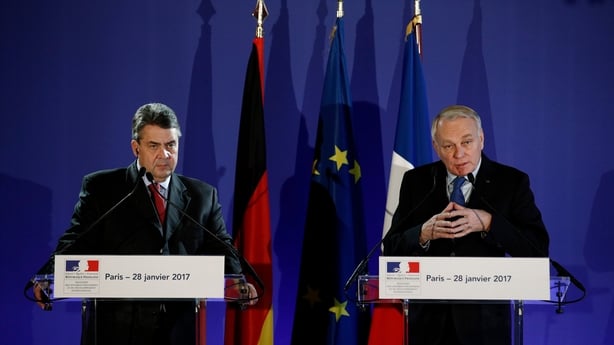German Chancellor Angela Merkel and US President Donald Trump agreed on the fundamental importance of the NATO alliance and that all NATO members must pay a fair share for their collective security, the two leaders said in a joint statement.
Mr Trump and Ms Merkel spoke by telephone about issues including the Middle East, North Africa, their ties to Russia and the conflict in eastern Ukraine, a German government spokesman said, in a statement approved by both countries.
He said Ms Merkel and Mr Trump agreed to expand their co-operation in combating terrorism and militancy.
Mr Trump accepted Ms Merkel's invitation to attend a summit of G20 industrialised countries in Hamburg in July, and said he looked forward to welcoming Ms Merkel to Washington soon.
.@POTUS speaks with German Chancellor Merkel from the Oval Office. One of five heads of government calls today pic.twitter.com/xMNl3A3Iw0
— Sean Spicer (@PressSec) January 28, 2017
Mr Trump also spoke to Russian President Vladimir Putin by phone and had what was described as a "positive" call.
Both leaders have favoured their two countries co-operating in Syria to defeat the so-called Islamic State militant group, the Kremlin said in a statement.
In an eagerly awaited phone call, the first since Mr Trump's inauguration, the two men stressed the importance of restoring economic ties between the two countries and of stabilizing relations, the Kremlin said.
US-Russia relations had hit a post-Cold War low under former president Barack Obama and Mr Trump has made clear he wants a rapprochement with Moscow if he can get along with Mr Putin.
"Both sides demonstrated a mood for active, joint work on stabilising and developing Russian-American cooperation," the Kremlin said in a statement, saying Mr Putin and Mr Trump had agreed to work on finding a possible time and place for a meeting.
There was no mention in the statement that the possibility of Mr Trump easing sanctions on Moscow imposed over the Ukraine conflict had been mentioned, a subject widely expected to be raised.
The Kremlin said Mr Trump and Mr Putin had agreed to establish "partner-like co-operation" when it came to global issues such as Ukraine, Iran's nuclear programme, tensions on the Korean peninsula and the Israeli-Arab conflict.
Mr Trump's stance on Russia has been under intense scrutiny from critics who say he was elected with help from Russian intelligence, an allegation he denies.
His detractors have also accused him of being too eager to make an ally of Mr Putin.
For Mr Putin, an easing of Western sanctions would be a major coup ahead of next year's presidential election as it would help the economy recover.
Mr Trump has rattled America's traditional European allies with a range of radical policy plans.
He has called NATO "obsolete", and announced that he would rip up a planned transatlantic trade plan and supported Britain's move to leave the EU.
Hollande urges Trump to 'respect' principle of accepting refugees
French President Francois Hollande warned his new Mr Trump against adopting a protectionist stance and called on him to respect the principle of accepting refugees.
Yesterday, Mr Trump signed an order to strengthen the vetting of would-be immigrants or refugees and to keep "radical Islamic terrorists out of the United States of America".
During a telephone conversation between the two leaders, Mr Hollande stressed the "economic and political consequences of a protectionist approach", the Elysee Palace said in a statement.
Earlier, France's foreign minister said his country was "concerned" over a number of decisions by Mr Trump, particularly his move to restrict refugee arrivals.
"Welcoming refugees who flee war and oppression is part of our duty," Jean-Marc Ayrault said at a joint news conference with his German counterpart Sigmar Gabriel.

Mr Gabriel said: "The United States is a country where Christian traditions have an important meaning. Loving your neighbour is a major Christian value, and that includes helping people.
"I think that is what unites us in the West, and I think that is what we want to make clear to the Americans."
During his campaign, Mr Trump tapped into American fears about so-called Islamic State militants and the flood of migrants into Europe from Syria's civil war, saying refugees could be a "Trojan horse" that allowed attackers to enter the United States.
In December 2015, he called for a ban on all Muslims entering the United States, drawing fire for suggesting a religious test for immigrants that critics said would violate the US Constitution.
His idea later evolved into a proposal for "extreme vetting."
Mr Trump's order also suspends the Syrian refugee program until further notice, and will eventually give priority to minority religious groups fleeing persecution.
Mr Trump said in an interview with the Christian Broadcasting Network that the exception would help Syrian Christians fleeing the civil war there.

